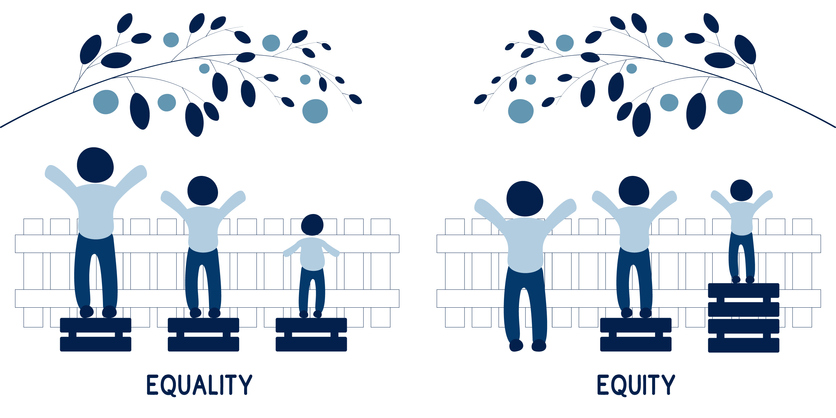School districts ditch grades and tests in the name of equity, but they are setting students up for failure, say teachers.
By Eileen Griffin
Public school districts in a number of states are eliminating homework and grades in the name of equity.
Nationwide, there is a trend toward a system where students are assigned homework without any requirement to complete it, and they are allowed to retake tests as many times as necessary, if assessment tools are even utilized, reports Kaylee McGee White in the Washington Examiner. In addition, behavior and attendance are no longer considered in grading in some schools.
Silver State Chance
Clark County School District, the fifth largest government K-12 system in the United States, is implementing equitable grading, The Wall Street Journal reports.
“Under the overhaul, students are given more chances to prove they have mastered a subject without being held to arbitrary deadlines, in recognition of challenges some children have outside school,” states the WSJ.
Critics of traditional grading methods say it offers an advantage for children living in a stable family home while equitable grading aims to assist students in less fortunate circumstances.
In Las Vegas, Nevada, teachers report that under the equitable grading policy students are not held accountable for irresponsible behavior. They are not given the skills and attitudes likely to make them valuable contributors to the labor market.
“If you go to a job in real life, you can’t pick and choose what tasks you want to do and only do the quote big ones,” Las Vegas teacher Alyson Henderson, told the WSJ. “We’re really setting students up for a false sense of reality.”
Las Vegas teacher Samuel Wang is also against the equitable grading policy. He says even the high-achieving students are developing poor work habits.
“There’s an apathy that pervades the entire classroom,” Wang told the WSJ.
School districts in California, Iowa, Virginia, and other states have adopted similar policies.
Baltimore Ends Homework
In Maryland, the Baltimore County Public Schools changed their grading policy in 2016. Teachers were told to stop grading their students’ work. The policy is a failure, Baltimore teacher Suzanne DeMallie wrote in a letter to the WSJ.
“Under the new policy, teachers were told not to grade homework,” DeMallie wrote. “Immediately, 70 percent of my students stopped doing homework, making it meaningless to go over the answers in class.”
DeMallie said the negative effects of equitable grading outweigh any positives.
“These policies aren’t teaching students to be responsible and accountable for their work,” DeMallie wrote. “Inflated grades only mask a lack of proficiency. Equitable grading may decrease the number of failing grades, but districts that adopt it are the ones failing.”
No AP Classes
In 2023, Culver City High School in Los Angeles County, California eliminated advanced placement classes, The Wall Street Journal reported. Supporters claimed it would ensure equity in education, regardless of race.
Heartland Daily News reported during the COVID-19 pandemic emergency on the movement toward equity and away from merit-based education. From kindergarten to university graduate schools, administrators were “declaring war on meritocracy,” ditching achievement tests and entrance exams like the SAT, wrote Jason L. Riley in a commentary in The Wall Street Journal.
Supporters of this approach claim it helps students experiencing hardships, by creating a more relaxed atmosphere in classrooms.
“In the real world, grades and high standards motivate students to work hard,” states an editorial in the Las Vegas Journal. “If you give kids an easy way out, many will eagerly take it. Lower expectations become self-fulfilling.”
Systemic Racism?
Education has been caught up with other racial grievances, says White.
“Self-discipline is just another form of white supremacy, according to the Left, as is the idea that people must actually work for what they want,” wrote White. “Thus, testing, grades, and any other form of academic rigor are being discarded as outdated symptoms of systemic racism.”
Students with greater interest and the capacity to learn quickly should not be held back by the ability of others, says Larry Sand, president of California Teachers Empowerment Network, who is a former teacher.
“In the age of equity, very sadly, individualism and exceptionalism are being punished,” said Sand. “Whether due to nature or nurture, kids learn at different speeds. Why slow down the quick learners to a slower speed? It is quite counterproductive.”
Misguided efforts to improve outcomes for children are harming vulnerable students, says White.
“Proponents of equitable learning believe they are helping underprivileged students, but in reality, they are setting them up for failure,” White wrote. “Very few successful people would be where they are right now if they had not been forced to develop the character and determination required to succeed.”
